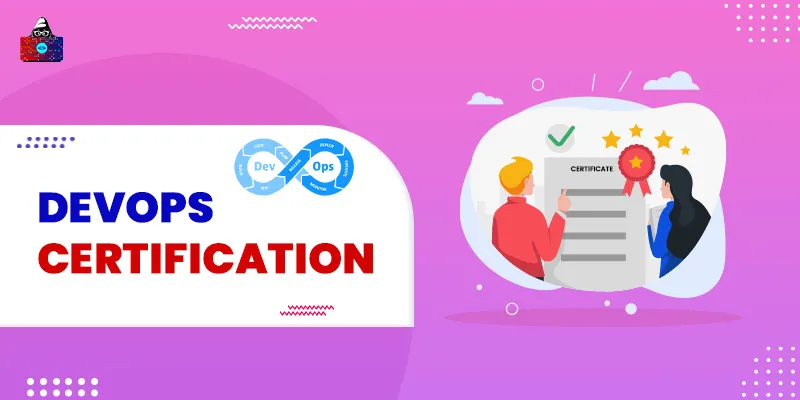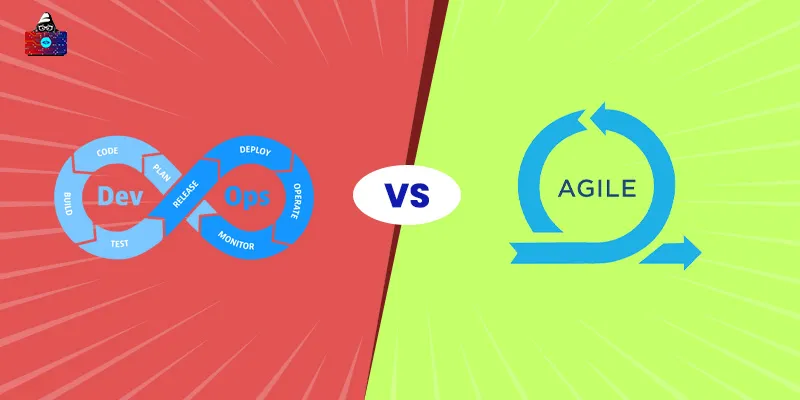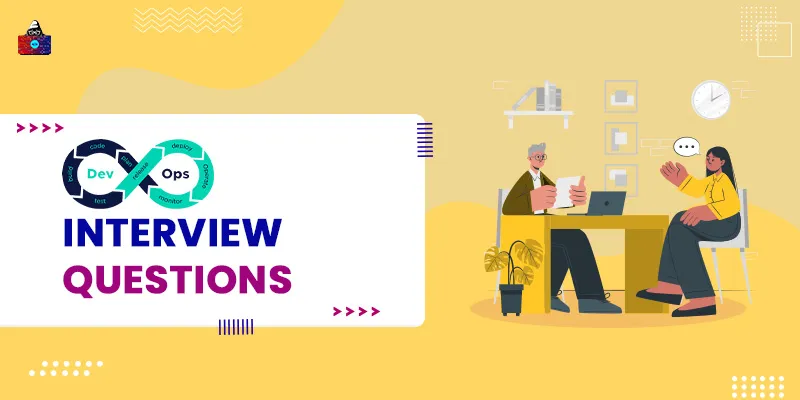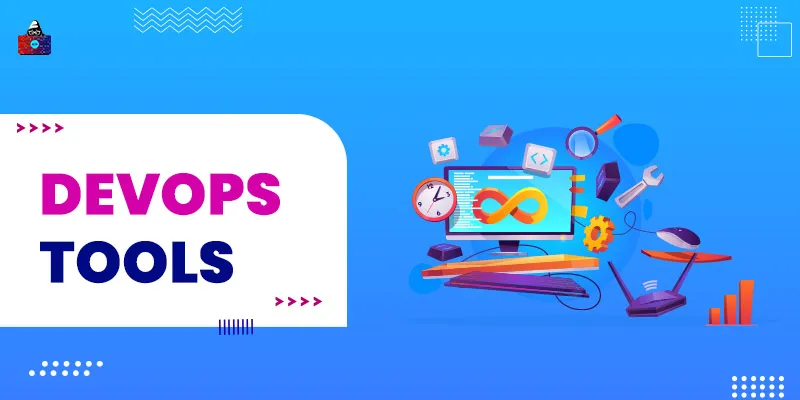Here in this post, we have explained the major roles of DevOp engineers, the need to learn DevOps, and some of the best DevOps certifications for you.
DevOps is an amalgamation of development and operations. It’s a trending practice that is being widely adopted by tech organizations worldwide. As such, DevOps certification has become a buzzword these days.
It is not just a development practice or a set of automation tools, but it can be thought of as a culture that brings development and operations teams together to work on products collaboratively.
DevOps engineers bridge the communication gap between developers and operations teams because they bring software development skills such as agile methodologies and skills related to IT operations, such as infrastructure management and configuration, and automation together.
The main goal of these engineers is to transform infrastructure to code by creating full-proof solutions to automate the entire infrastructure and deploy it to the cloud using a set of tools for continuous delivery, integration, and monitoring.
To learn about DevOps in detail, you can purchase this course .
What do DevOps Engineers Do?
These DevOps engineers are responsible for carrying out operations that streamline and automate the entire software development lifecycle . They use a set of tools to automate the infrastructure and monitor services that allow continuous feedback. Let’s discuss a typical DevOps lifecycle.
DevOps Lifecycle
The first phase is the planning phase, where the developer decides what approach to take based on the requirements and decides the structure of modules and other functional requirements.
Next comes the development phase, where the engineer codes the entire algorithm, creates modules and integrates them. The engineer then pushes the code to a central shared repository like Git, where other members working on the same product merge the commits to the master branch.
The code and any new commits are fetched from such repositories by tools like Jenkins, Maven, and Gradle and made executable for building. It is then tested for bugs and can be done using automation tools, the likes of Selenium.
After testing the product, it’s deployed on the production server, and after deployment, DevOps engineers have to configure it continuously as and when required using tools like Chef, Docker, Ansible, and Puppet. After deployment, a product is continuously monitored using tools like Nagios, and the feedback is sent automatically to the development teams.
The core idea behind DevOps is the amalgamation of different elements of the infrastructure and ensuring that they are connected. Whenever a new commit is made, it gets continuously integrated into the pipeline.
DevOps engineers are responsible for carrying out end-to-end operations involved in a typical development life cycle and devise automated solutions that help them solve problems, improve performance, and allow the frequent release of features. Hence, an engineer should be well-versed in all the necessary tools and technologies so that they can utilize them in the best possible way to reduce manual effort to a minimal level.
Why do You Need a DevOps Certification?
An accredited certification in DevOps verifies the skills and knowledge of a candidate in a particular subject and helps in building a strong portfolio. It tells the recruiters that the candidate has hands-on working experience.
A DevOps certification proves that the candidate has achieved competitive standards through performance reviews, various assessments, quizzes, and educational courses.
Reasons to Go For a DevOps Certification
Some of the most convincing reasons why getting an accredited DevOps certification is a good idea are:
- You can stay up-to-date with the latest skills and trends.
- You can put it on your CV to demonstrate verifiable skills.
- It tells recruiters that you have gone through rigorous assessments and quizzes to achieve the best possible training.
- A DevOps certification allows you to display the projects that you have completed along with the certification program.
No doubt, the DevOps role is considered one of the highest-ranked jobs worldwide with high-paying salaries and other benefits. Hence, earning a certification is just the cherry on the cake. It will help you get the best possible job out there, in addition to making you ready to work in a team of professionals that includes QA testers, business analysts, and operations engineers.
There are many certifications available online. Thus, finding out the right DevOps certification that holds some value and is accredited by top organizations is a difficult task. Websites and small companies hand out a certificate even for the silliest of tests today.
Hence, it reduces the status of even the top certifications, and it becomes difficult for recruiters to understand the value of the certificates and distinguish a valuable one from a fake one. In short, you should always talk to other industry experts and professionals before spending money on such certifications.
To save you the hassle, we have listed below the top 10 most accredited certifications that you can take away right now.
10 Best DevOps Certification Programs in 2023
1. AWS Certified DevOps Engineer - Professional
It is one of the most popular certifications right now and is highly recognized by industry professionals and experts worldwide. It helps you to validate your DevOps skills and knowledge to advance your career.
This is a professional exam intended for professionals with two or more years of experience in configuring, operating, provisioning, and managing infrastructures in AWS environments. It validates your abilities such as implementing CD and CI systems on AWS, automated security controls, validation of compliance, governing and monitoring processes on AWS, deploying metrics, and logging.
This DevOps certification tests your ability to create highly-scalable systems that can self-heal on AWS.
Syllabus
- Infrastructure as Code.
- Configuration management on AWS.
- Automation of SDLC life cycle.
- Logging, security, and monitoring of services on AWS.
- Creating highly-scalable environments with high availability, fault tolerance, and automatic recovery from failures.
- Compliance with standards and policies.
Cost - USD $300
Pattern - 75 MCQs
Duration - 180 minutes
2. Microsoft Certified: DevOps Engineer Expert
Similar to AWS, Microsoft Azure is also a cloud-computing platform. This certificate is meant for candidates and professionals who have strong subject matter expertise related to continuous delivery while interacting with businesses, people, and processes.
To take up this certification program, professionals must have expertise in responsibilities such as implementing and designing methods and solutions that allow teams to collaborate, transform infrastructure to code, perform continuous integration and monitoring of services, and manage configurations, testing, and feedback.
Candidates aspiring to earn this DevOps certification must be familiar with development using Azure administration and should have enrolled for certifications such as Azure Administrator Associate and Azure Developer Certificate .
Syllabus
- Developing strategies for instrumentation and SRE.
- Creating compliance and security plans.
- Inculcate collaboration and communication between teams.
- Managing source control.
- Implementing CI, CD, and release management plans.
Cost - USD $165
Pattern - Around 60 MCQs
Duration - 170 Minutes
3. Become a Cloud DevOps Engineer - Nano-Degree Program
This certification course by Udacity allows you to learn DevOps by getting hands-on experience with real-life projects. You will learn how to plan, build, and monitor pipelines for CI/CD. You will also learn to create infrastructure as code (IaC) .
After the successful completion of the course, you will be able to deploy strategies, and microservices that are highly scalable using tools like Kubernetes.
To start with the course, you need to have experience working with HTML, CSS, and Linux commands and basic knowledge of operating systems.
Syllabus
- Cloud computing topics such as security, storage, service management, messaging, and computation.
- Transform infrastructure to code by writing scripts for cloud platforms using AWS tools and CloudFormation.
- Building pipelines for continuous delivery and integration along with monitoring and logging.
- Kubernetes and creating scalable microservices with it. Clusters, autoscale, container orchestration, and so on.
Cost - INR 17,139 a month for a pay-as-you-go model or a one-time fee of INR 47,996
Pattern - Real-world projects, interactive videos, articles, assignments, capstone
Duration - 4 months
4. Professional Cloud DevOps Engineer - By Google Cloud Platform
It is a Google accredited certification provided by GCP for professional cloud engineers. These professionals are usually responsible for carrying out development operations efficiently in order to balance frequent delivery with the reliability of service.
This certification is for professionals who are skilled with GCP and can build pipelines for delivering software, monitoring services, and deploying them. The recommended experience for professionals who want to take up this certificate is three or more years of industry-level expertise and one or more years of experience with GCP managing solutions.
Syllabus
- Managing service-related incidents.
- Building CI/CD pipelines for services and implementing them.
- Optimizing the performance of services.
- Implementing strategies and plans for monitoring services efficiently.
- Applying SRE principles.
Cost - USD $200
Pattern - MCQs
Duration - 2 hours
5. Introduction to DevOps: Practices and Tools - by EdX
This is a certification course provided by EdX, which is meant for beginners. In this course, you will learn about the role of DevOps in current development practices, and also about the open container ecosystems, and how to write infrastructure as code.
It educates learners in CI, CD, and continuous deployment in software delivery and how they combine to create a development pipeline. You will also learn about observability systems and implement CI/CD workflows.
This DevOps certification course also explains how to create scripts that run on cloud platforms without any restrictions on language or cloud vendors.
You don’t require any prerequisite knowledge of any programming language or tools to take up this course. Thus, you can start from the very beginning.
Syllabus
- CI and CD workflows.
- Create infrastructure as code.
- Observability systems.
- Working with Kubernetes to create highly scalable container environments.
- The elemental knowledge of CI/CD using the Jenkins server.
Cost - INR 33,791
Pattern - 3 courses with quizzes, assignments, and tutorial videos
Duration - Seven Months or self-paced
6. DevOps Certification Training - by Edureka
This course on Edureka is an ideal certification for testifying in-depth knowledge in DevOps. It details the best practices in continuous development, continuous integration, continuous management, and continuous monitoring.
A candidate with this certification has a working knowledge of Ansible, Docker, Git, Grafana, Jenkins, Kubernetes, Terraform, and Prometheus.
Syllabus
- Overview of DevOps, its market, skills, ecosystem, and so on.
- Version control using Git.
- Integration of Git with Jenkins and Maven for build and test automation.
- CI using Jenkins.
- Continuous testing using Selenium.
- Continuous deployment using containers.
- Configuration management using Puppet and Ansible.
- Tools such as Nagios for monitoring of services.
Cost - INR 17,995
Pattern - Instructor-based online live classroom course
Duration - Weekdays (18 days) and Weekends (6 Weeks)
7. Continuous Delivery & DevOps - by Coursera
This course on the Coursera platform is developed by the University of Virginia for beginners who want to start their career paths in DevOps. You can get insights on analyzing a delivery pipeline and making its performance better. It will take you through skills and roles that are prevalent in the industry and teach you how to contribute to CD pipelines using these skills.
The certification course reviews automation tests and improves the already implemented delivery pipelines. Nonetheless, you need to have a basic knowledge of computer programming and software development principles to take on this course.
You will get access to several quizzes, assignments, and insights from industry experts.
Syllabus
- Delivery pipeline, test stack, and test automation.
- Automated testing and exploring the test stack.
- Transforming infrastructure to code and analyzing the operations in a pipeline.
- Continuous delivery.
Cost - INR 4,326
Pattern - Video tutorials, assignments, and quizzes
Duration - 8 hours
8. DevOps Foundations - LinkedIn Learning
This course was created by DevOps experts Ernest Mueller and James Wickett. It focuses on the basics and foundational practices of the popular methodology, including automation, principles, CAMS, culture, and other practices.
The certification explains the entire building block of DevOps and its link to agile development and lean development practices. You don’t need any previous expertise for this course. It will also take you through SRE, CD, and infrastructure automation.
Syllabus
- Introduction to DevOps. Basics such as core values, principles, practices, and culture.
- Kaizen for continuous improvement.
- Building blocks such as agile, lean, and old practices such as ITIL, ITSM, and SDLC.
- Infrastructure automation and Infrastructure as Code (IaC).
- The CI/CD pipeline toolchain.
- Software Reliability Engineering.
- Future of DevOps.
Cost - You need a premium LinkedIn account
Pattern - Video tutorials, assignments, and quizzes
Duration - 3 hours
9. Certified Kubernetes Administrator (CKA) - by CNCF
This is a Kubernetes-specific certification program that aims to assess a Kubernetes administrator’s skills. It contains a set of performance-based questions, and these questions have to be solved in a CLI, which will help the candidates to demonstrate their skills.
The candidates who want to take up this certification of Kubernetes Administrator are recommended to have in-depth knowledge of Kubernetes and hands-on experience working with it.
Syllabus
- Lifecycle management of applications.
- Core concepts of Kubernetes.
- Networking, scheduling, and security.
- Logging and monitoring.
- Security and troubleshooting.
- Installation and validation.
- Configuration management
Cost - USD $300
Pattern - Problem Solving in Command Line Interface
Duration - 3 hours
10. Puppet Professional Certification
Puppet is one of the most popular tools for configuration management in DevOps. Hence, this certification is quite popular, and valuable and can provide verification of your skills.
This certification exam will test your skills and knowledge of Puppet tools, and you need to have hands-on experience working with Puppet in order to ace this examination.
After you have applied for this certification, you will be able to perform operations on a remote system infrastructure with the help of Puppet and need to carry out certain tasks. Also, you will be able to learn external data sources, separation of data, language style, and more.
Syllabus
- Classification strategies.
- Troubleshooting the Puppet code.
- Module authoring with Forge.
- Concepts such as resource abstraction, idempotence, and facts.
- Bolt and Orchestration.
- Puppet environments.
- Puppet administration.
Cost - USD $200
Pattern - 60 MCQs
Duration - 90 minutes
Wrapping Up!
In this article, we have discussed a trending software development culture called DevOps and the role of an engineer in the same. Also, we skimmed through a few good reasons why you should go for at least one certification as a professional to verify your skills.
We discussed the top 10 DevOps certifications that you can do in 2023, along with their features, syllabus, cost, the pattern of exams, and duration. We hope that you can get a birds-eye view of all the top accredited certifications available online and decide on the best one for you.
Happy Learning!
People are also reading:





Leave a Comment on this Post